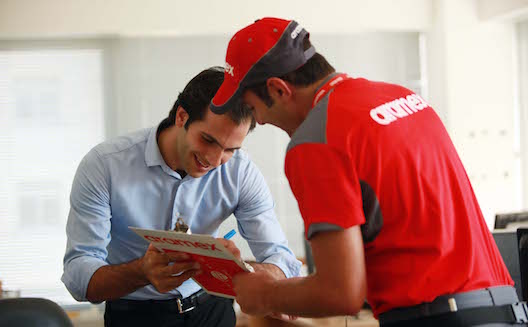Searching for success in MENA's postal address sector


"Yes, I will sign for that package." (Images via
Aramex)
“So you take the main street, you turn at the pharmacy after the streetlight, then it’s the second building on your left.”
Does this sound anything similar to the way you describe your address?
The lack of standardized postal addresses means more time spent trying to deliver orders, and in worst case scenarios means undeliverable orders, a huge challenge for e-shop owners, restaurants and businesses whose business models rely on deliveries.
The field should be wide open for imaginative and creative entrepreneurs to make locations easily identifiable. In fact, some entrepreneurs have tried to do this over the last few years, but they had limited success.
Some companies, like Aramex and BoxStop, are getting around this problem by having orders delivered to a locker or a convenience store where customers can collect the delivery themselves.
We spoke with the founders of Enwani, an app that links a user’s phone number with their geolacation, and Addy, a service that lets users create a simple, custom URL for their location, about why they shut down, and if they eventually expect other companies to find success in this space.
The scaling problem
Enwani, which means 'my address' in Arabic, was an easy service to use: users simply needed to download the app which geolocalized their home, and input their phone number. Their location and phone number were then linked and stored on Enwani’s server, businesses using Enwani could then access this information to identify a customer’s exact location. But there was a catch. For it to work customers had to be using Enwani as well.
“It is a chicken and egg situation,” said Enwani’s founder Abdallah Elyas, “If you don’t have a lot of clients in the cloud, it’s not really interesting for the pizza store; if you don’t have enough partners, then it’s not very interesting for the clients to download the app. So it’s double effort - we have to do sales on both sides.”
Silicon Valley-based Addy had a similar problem. Despite a service so simple “my mommy could use it,” according to cofounder Khaled Naim, “adoption was slow.”
The monetization problem
Getting clients was only part of the problem. Proving the value of the services was another.
According to Elyas, the delivery rate - the number of deliveries a driver could make in one day - increased by 30 percent at Ikea Saudi, one of their 40 offline and online clients. Unfortunately, it wasn’t enough.
“We were making money, but we were far from breaking even,” Elyas said. The startup had two sources of revenue. One was a monthly fee for corporations for every delivery car equipped with Enwani’s technology. The other was the sale of data. But asking companies to pay for intangible products is always tough, more so for data.
“It was working but it didn’t make sense to focus on the addresses if you couldn’t integrate it with the bigger portion of the delivery process,” he continued. “The pizza place is not okay with paying for having his address in the cloud but is okay with paying for the delivery.” So the team decided to repackage their offer and to focus on the entire delivery process upon joining Careem.
The team at Addy came to the same conclusion. They rebranded their company as Onfleet over a year ago and recently relaunched as a delivery management system.
For logistics veteran Aramex, vague addresses are not as big a challenge. “It is an issue but we’ve been doing this for the last 30 years, so we have a pretty advanced address management system,” explains Aramex’s COO Iyad Kamal. But that doesn’t mean that the overall delivery system cannot be improved, or that the current situation isn’t a pain point for clients.

Aramex's upcoming lockers.
The delivery giant plans to launch a new service in the UAE called Click and Collect that will enable customers to retrieve their packages from lockers located in convenient areas and accessible day and night. “It’s convenient, there are a lot of personalized deliveries when we have to ensure signature and we collect cash on delivery,” he said. This should all happen automatically at any of the 40 lockers installed in Dubai.
Next up, Kamal says, they plan expand to the rest of the UAE, then Saudi Arabia, the rest of the Gulf countries, and more. “UAE is one of the biggest market for us; it was easier for us to find locations, and people were more open-minded to innovation,” Kamal noted. “It made sense to prove the model there and then install it in other countries.”
The startup, launched in October 2014, has signed five e-shops - three more are expected to join soon - and established 40 pickup locations throughout the country.

A BoxStop collection point. (Image via BoxStop)
But those two services are only solutions to small, non-urgent deliveries. What about food and larger items? According to Kamal, we shouldn’t worry too much about it. “There is innovation out there but eventually the problem is going to go away because people are starting to use their addresses.” Sure, but how long will that take? And when will everyone in the region have and use a postal address? Innovators, you still have time to change the game!
You might also be interested in these articles:


